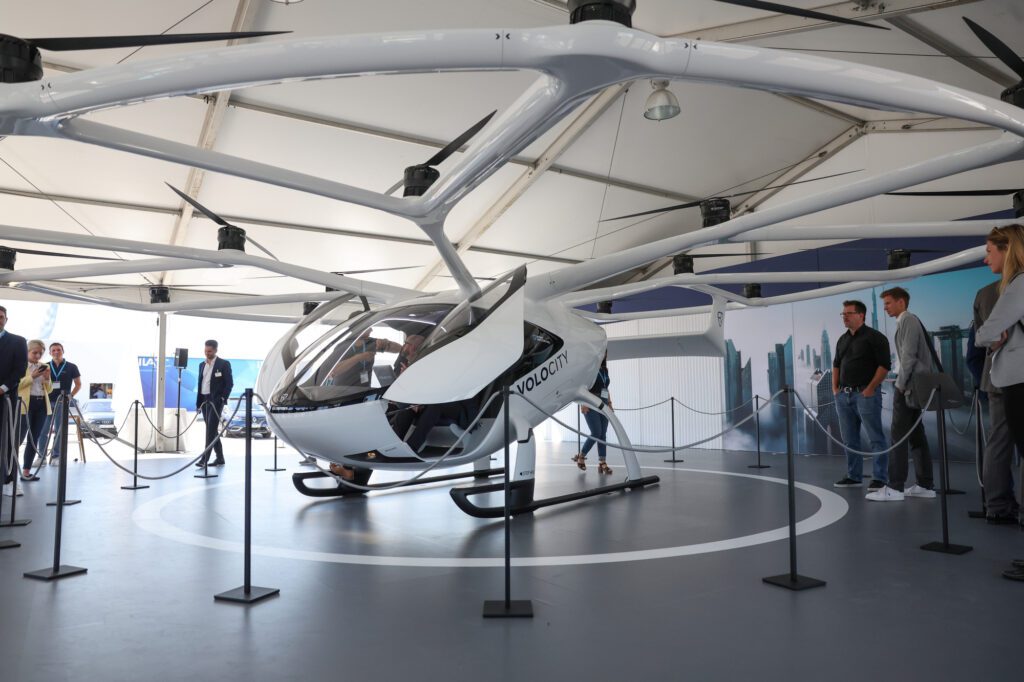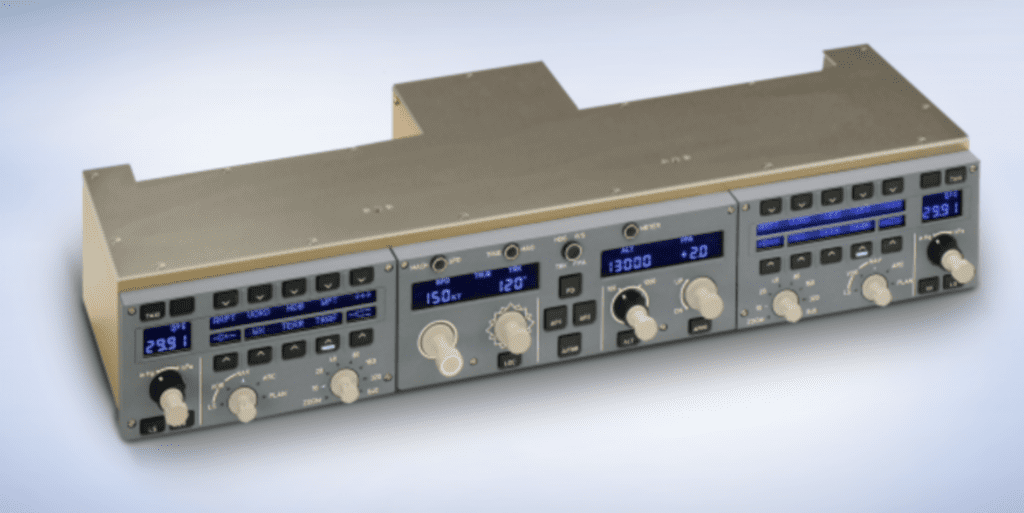Diehl Aviation to Develop Optical Avionics Communications for Volocopter’s Air Taxi


Diehl will develop and produce optical avionics communications for Volocopter’s eVTOL aircraft. Volocopter’s VoloCity model was on display at ILA Berlin 2022 last week. (Copyright: Messe Berlin GmbH)
Volocopter and Diehl Aviation are expanding their existing partnership, according to an announcement from Diehl last week. Volocopter has commissioned Diehl to design and produce an optical splitter to provide control information to the 18 rotors on Volocopter’s aircraft. Diehl will also develop the Data Concentration Unit (DCU) for Volocopter.
In May 2020, Diehl Aviation and Volocopter signed an agreement for Diehl to develop and produce the flight control computer system for Volocopter’s electric air taxi, the VoloCity. Diehl Aviation supplies aircraft system and cabin solutions, and includes the Diehl Aerospace division—a joint venture with avionics maker Thales. Diehl has already completed development of both the primary and backup flight control computers for the VoloCity. Diehl and Thales were also previously selected to supply flight control computers for another electric vertical take-off and landing (eVTOL) aircraft—Airbus’s CityAirbus NextGen.
The extended contract between Volocopter and Diehl includes development of the optical splitter, sub-components for monitoring the batteries on the VoloCity, and the DCU. The optical splitter will translate electrical signals from the flight control computer into optical signals. The DCU then gathers and translates optical signals from the aircraft’s rotors.
The VoloCity will, essentially, be equipped with a “fly-by-light” control system that uses light signals and optical fibers to transmit information, rather than a conventional fly-by-wire that transmits electrical signals via copper wires. According to the announcement from Diehl, this is advantageous because a fly-by-light system is thought to be immune to electromagnetic interference and therefore can increase safety for Volocopter’s eVTOL.
Florian Maier, CEO of Diehl Aerospace, commented, “We are excited to further expand our partnership with Volocopter, an innovative pioneer in the UAM market, bringing our many years of experience and expertise in flight control systems to the table.”

The flight control unit developed by Thales and Diehl Aerospace (Photo, courtesy of Diehl)
At the ILA Berlin Air Show last week, a mock-up of the VoloCity aircraft was on display for attendees to view. Lucie Prinz, Chief People Officer (CPO) at Volocopter, and Alexander D’Orsogna, Head of Business Development, both offered some updates from the company at the event. “We’re going to launch our first commercial routes in 2024,” stated Prinz, “and we have over 30 cities lined up for commercial launch. We are working with partners in operations, infrastructure, and air traffic management. We want to bring this ecosystem to life—not just one vehicle.”
Volocopter’s team has recorded over 1,500 test flights so far. Though the VoloCity aircraft is intended to be the first fully certified electric air taxi for urban air mobility, the company’s other two models in development are also making progress. “VoloDrone, our heavy lift cargo aircraft, which is mainly going to be used for logistics, debuted in Hamburg last year,” Prinz shared. She added, “The VoloConnect, a fixed-wing longer range aircraft, completed its first test flight just last month.” The VoloConnect, with an expected range of about 60 miles, may enter into service in 2026.
Alexander D’Orsogna described Volocopter’s efforts as building a business model, not just creating a value chain. He also emphasized the importance of sustainability in their strategy to enable urban air mobility, and listed the milestones their team needs to achieve. “Our roadmap to sustainable UAM includes technology; certification; the ecosystem, including working with stakeholders and partners in each city and establishing infrastructure like vertiports and charging stations; and finally a global rollout, starting in 2024 in Paris.”
In addition to launching UAM operations in Paris and Singapore in 2024, Volocopter has selected four other locations for rollout in the near future: Rome, Seoul, NEOM, and China. “There are four important dimensions to be considered when choosing a market to roll out in,” D’Orsogna explained: “partnerships, customer acceptance, technology advancements, and regulations.”
The company remains committed to bringing its air taxi services to Paris in time for the 2024 Olympics. D’Orsogna estimates that they will be operating around 40 aircraft at the Olympics, and roughly 2,000 passengers could fly in Volocopter’s air taxis each day.
The post Diehl Aviation to Develop Optical Avionics Communications for Volocopter’s Air Taxi appeared first on Aviation Today.
—————
Boost Internet Speed–
Free Business Hosting–
Free Email Account–
Dropcatch–
Free Secure Email–
Secure Email–
Cheap VOIP Calls–
Free Hosting–
Boost Inflight Wifi–
Premium Domains–
Free Domains





